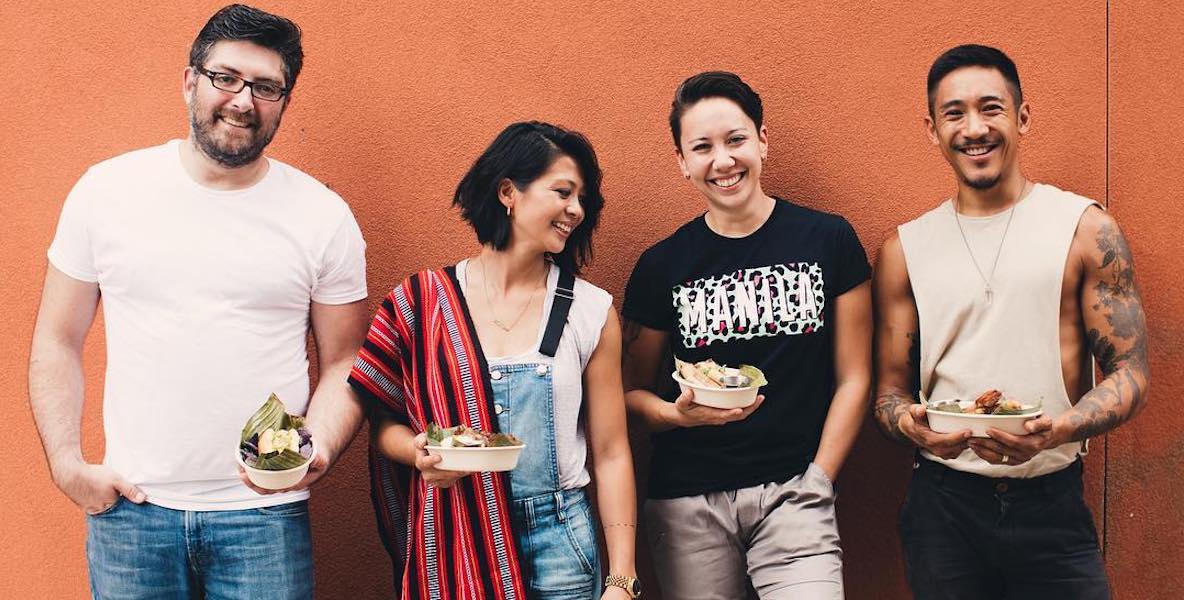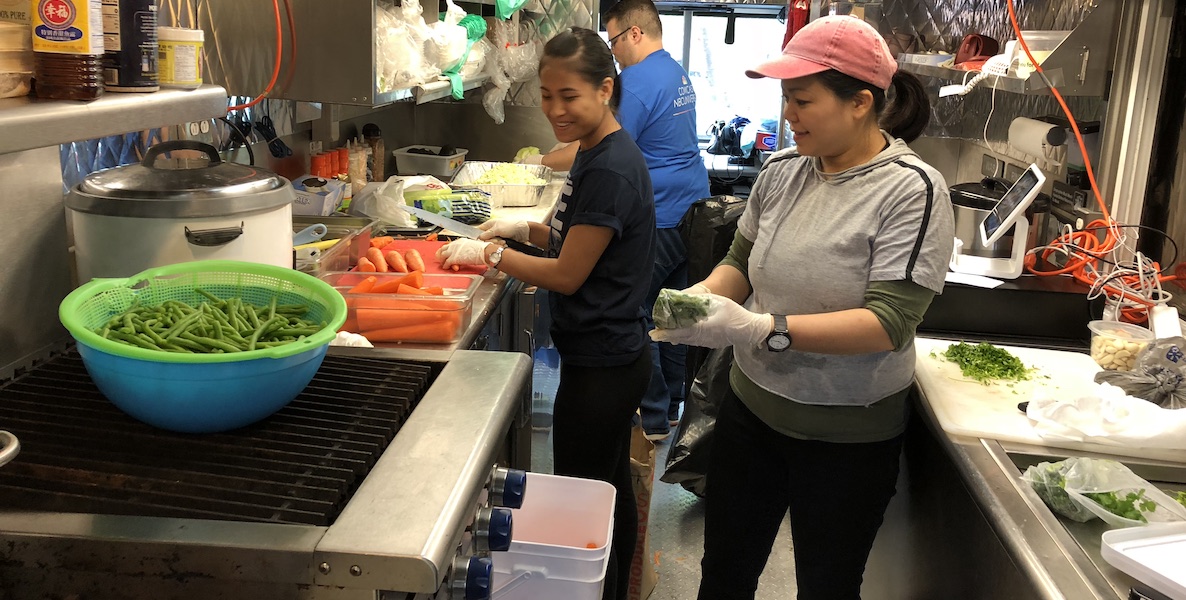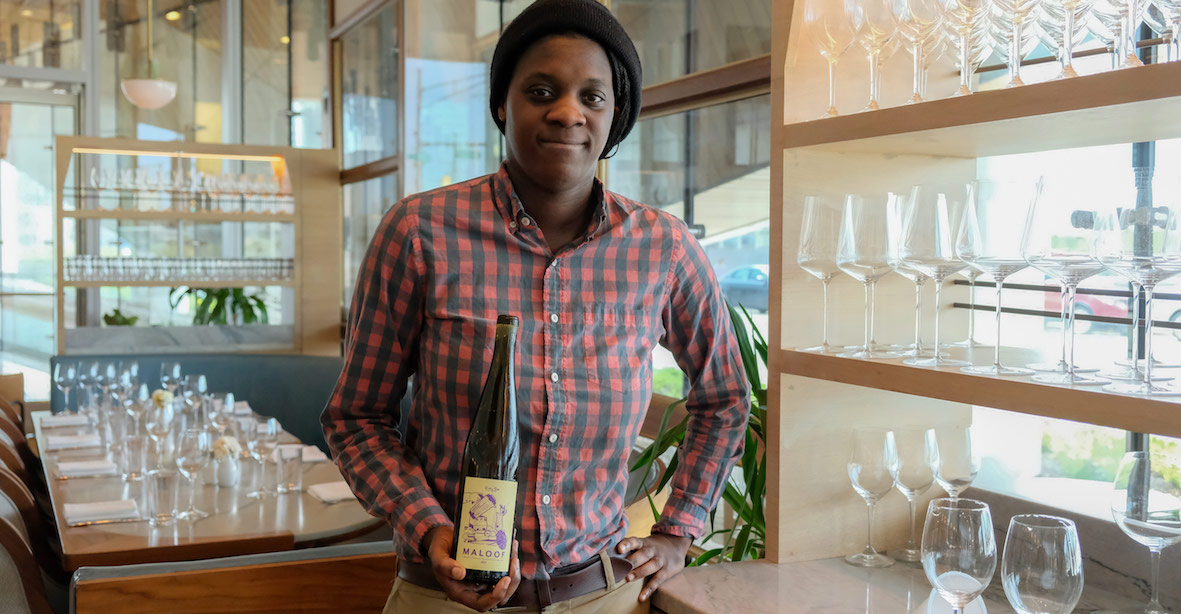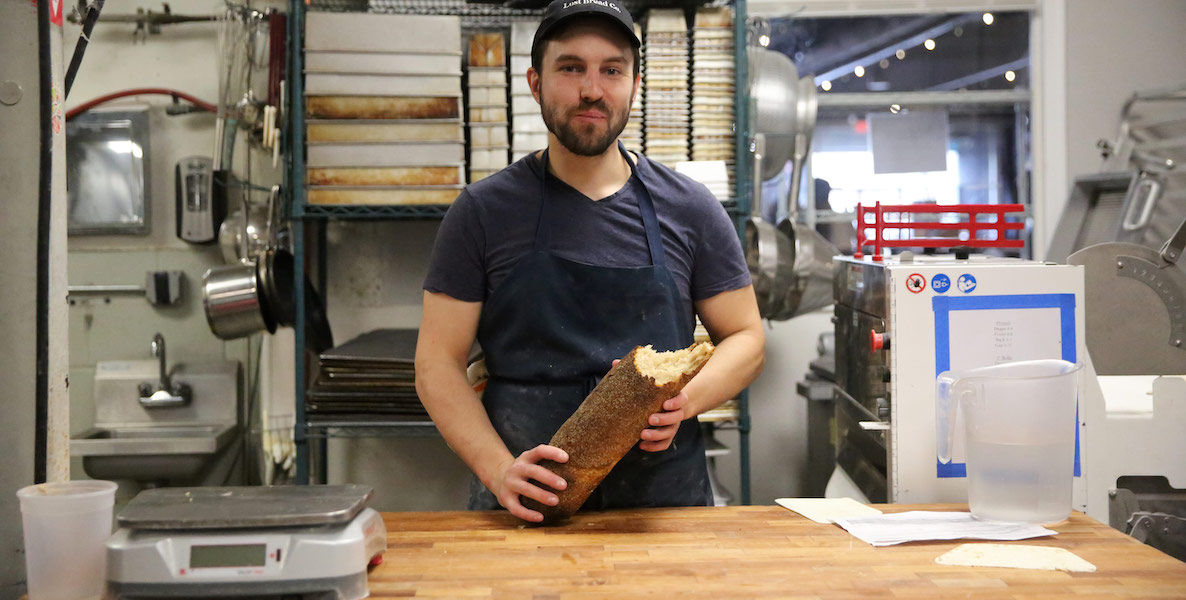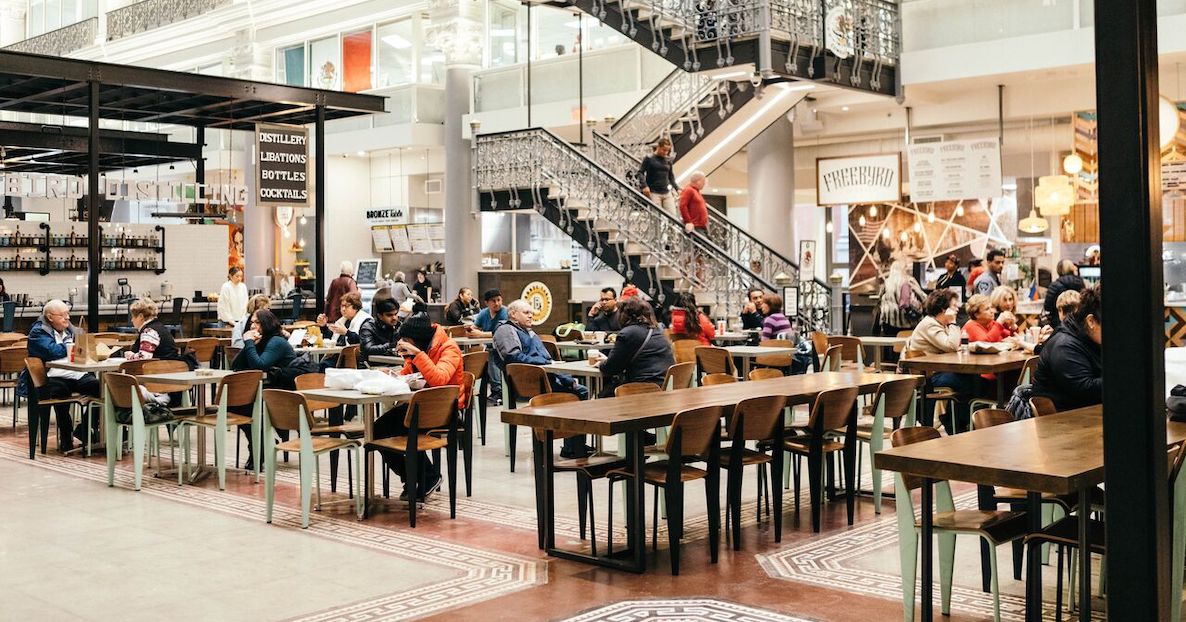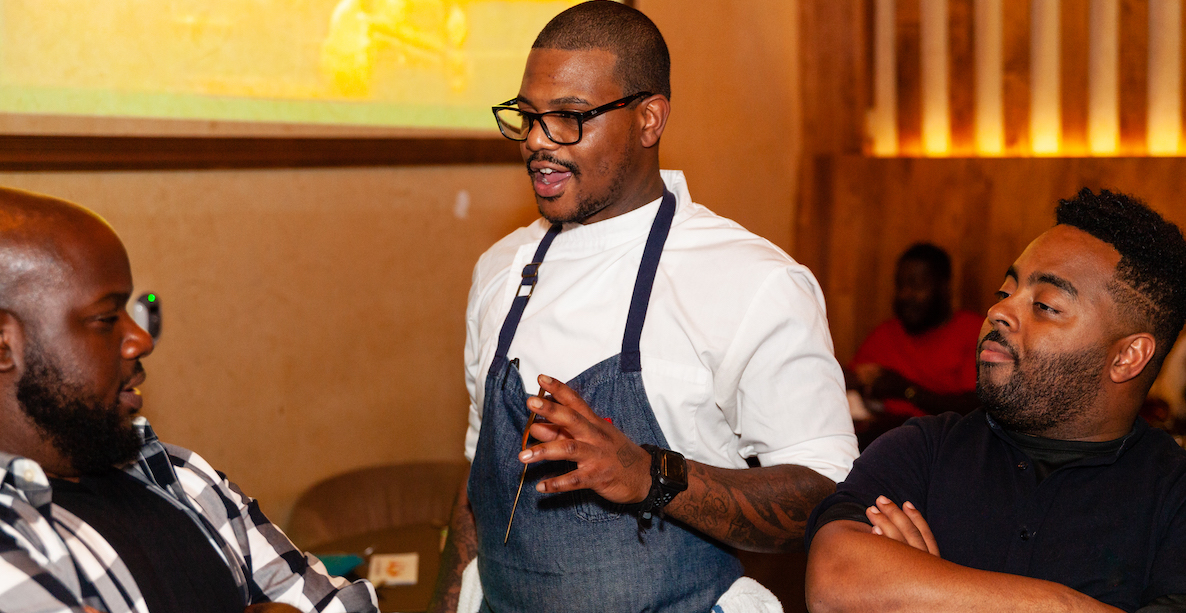When Michael Solomonov and Steve Cook announced in early June that they were closing The Rooster, it was bad news for mission-driven diners in the city. The Rooster, a philanthropic Jewish deli run by the James Beard Award-winning restaurant group that owns Zahav, Federal Donuts, and Abe Fisher—whose proceeds went to Broad Street Ministry’s Radical Hospitality—had begun life as a true grassroots project. Launched as a Kickstarter campaign with 1,500 backers, the original concept was to serve soup made from Federal Donut’s unused chicken parts.
“It made a statement that the hospitality industry is a natural leader in the struggle to care for the most vulnerable members of our community,” said Solomonov and Cook in a letter to supporters explaining their decision to shutter The Rooster.
The Rooster’s shutdown follows the closing in April of Drexel’s EAT Café, the nonprofit restaurant serving pay-what-you-can meals to the community in Powelton Village. There’s a certain sadness to the closing of these virtuous restaurants.
As the concept and menu evolved beyond soup, the operation became too unwieldy for CookNSolo. “Although the restaurant started strong two and a half years ago, for well over a year we have been funding losses out-of-pocket in an effort to buy time for The Rooster to find its footing,” they said. “For a restaurant whose fundamental premise is to generate funds for our nonprofit partner, this has become an untenable and counterproductive situation.”
![]()
The Rooster’s shutdown follows the closing in April of Drexel’s EAT Café, the nonprofit restaurant serving pay-what-you-can meals to the community in Powelton Village. At the time, Drexel officials told Philly Magazine’s Fooboz, “due to rising costs of operations and a loss of funding, the EAT Café is unable to continue providing high-quality food service for patrons and reasonable pay for staff.”
![]()
It’s not just happening in Philadelphia. In February, Panera closed the last of its pay-what-you-can restaurants. Last summer, Roy Choi and Daniel Patterson closed all California-based locations of Locol, their mission-driven fast food chain.
There’s a sadness to the closing of these virtuous restaurants. Why haven’t many socially-conscious concepts yet been successful? This is a topic we’ll be exploring as the summer goes on.
But for now, here at The Citizen, we’ll take this opportunity to highlight some of Philadelphia’s many other opportunities to dine, shop, and cook in ways that are compassionate, sustainable, and aware—to eat your values this summer.

Support urban farming
Too many areas of the city are still food deserts, with little access to affordable fruits and vegetables. Urban farming is one way to reverse this. Yet while we’re certainly seeing more and more urban farms, the concept is often fragile and in need of support. Consider what happened last year, when the long-time Kensington community farm La Finquita and its Little Farm Stand were shuttered over a property dispute with the owner of the abandoned lot where it operated. This was a true neighborhood loss, as whatever produce didn’t sell at the farm stand had been donated to the Catholic Worker’s daily soup kitchen. The city’s community gardens in general are in a state of crisis, with more than 200 community open spaces threatened by insecure land rights and development, according to Neighborhood Garden Trust, a land trust affiliated with the Pennsylvania Horticultural Society. One way to help is to buy your produce from one of Philadelphia’s numerous urban farming projects.
Greensgrow
Greensgrow has been connecting city dwellers and organic farming since 1997. As a nonprofit leader of urban agriculture, it’s dedicated to promoting social entrepreneurship through the reuse of land once deemed useless. Greensgrow began in Fishtown on a site that was once a factory and now boasts greenhouses, a garden center, and a farmstand that sells organic produce, including cheese, eggs, and sustainably raised meats and poultry. There’s also a location in West Philadelphia on Baltimore Avenue. Beyond the market, Greensgrow hosts agriculture workshops and tours, and offers paid internships.
Greensgrow Farms
2501 E. Cumberland Street, (215) 427-2780 x5
Hours: Wed-Fri, 12 pm-7 pm; Sat-Sun, 10 am-4 pm
Farmstand: Thurs, 3 pm-7 pm and Sat, 10 am-2 pm
Greensgrow West
5123 Baltimore Avenue, (215) 427-2780 x6
Hours: Wed-Fri, 12 pm-7 pm; Sat,10 am-4 pm; Sun, 10 am-5 pm
Farmstand: Sun, 10 am-5 pm.
Sankofa Community Farm
The four-acre Sankofa Community Farm at Bartram’s Garden — launched in 2017 in an area of Southwest Philadelphia that was a food desert — focuses on creating food sovereignty, and giving more control over food production and consumption, particularly among African Americans and recent African immigrants in the surrounding neighborhood. Sankofa — which means “go back and get it” in the Twi language of what is now Ghana — is powered by roughly two-dozen paid local high school interns, produces and distributes over 15,000 pounds of food each year, and works with more than 50 local families in its community garden. It also manages weekly neighborhood farmstands and grocery partnerships to sell its produce affordably and locally, and distributes over 80,000 vegetable transplants to over 130 farms and gardens around the city.
Sankofa Farmstand
Thursdays at 5400 Lindbergh Boulevard, 3:30 pm-5:30 pm
Saturdays at Clark Park Farmers Market (43rd and Chester) 10 am-2 pm
You can also become one of Sankofa’s 1,500 volunteers.
Weavers Way
The well-known Weavers Way food cooperative, with seven store locations throughout Northwest Philadelphia, supports a number of urban farming initiatives. Notable is its Weavers Way Farm Market, located at at W.B. Saul Agricultural High School in Roxborough, a magnet school and the largest agricultural high school in the nation. (More than three-quarters of the student population is African-American or Latino and nearly half are from economically disadvantaged households.) Weavers Way also offers workshops in nutrition and gardening, and its Food Moxie program partners with schools and community groups to educate kids through experiential learning in gardening, farming, nutrition, and culinary arts.
Weavers Way Farmers Market
Tuesdays and Fridays at 7095 Henry Avenue, 12 pm-7 pm; the farm market specializes in produce harvested from the school as well as Weavers Way’s farm site at Awbury Arboretum
After working as head butcher at Kensington Quarters, Thomason built a supply chain to connect regional farmers and slaughterhouses to restaurants, chefs, and home cooks. She only works with local farmers who sustainably raise animals in healthy environments.
Gain more culinary literacy
The Culinary Literacy Center is the Free Library of Philadelphia’s commercial-grade kitchen that serves as a classroom and dining space for city residents; it opened in 2014. You can now take kitchen classes including butchering demonstrations, fruit preserves seminars, salad how-tos, explorations of cuisines from Africa, Italy, Mexico, and more. There are adult nutrition workshops, and a popular “Teens Cook!” program for grades 7 through 12 brings math, science, history, and culture into the kitchen. Many of the classes are free or have a nominal registration fee.
![]()
One of The Culinary Literacy Center’s essential programs has been the groundbreaking Edible Alphabet program, in which new immigrants gather in the kitchen classroom to cook together while learning English under the guidance of both a chef and an ESL instructor. Originally developed along with the Nationalities Service Center, the Edible Alphabet program has become a nationwide model. There are now also Edible Alphabet classes for the general public, for those who want to learn Spanish and Italian, too.
For a list of upcoming classes, programs, and events, check out The Culinary Literacy Center’s calendar.
Shop and learn…sustainably
Look for foodstuffs made by people who do things the right way: sustainably and locally-sourced. Often, these artisans are more than willing to share the how-to of their craft through classes. Here are a few examples:
Primal Supply Meats
Heather Marold Thomason’s fast-growing butchery just opened its new headquarters in Brewerytown, along with a second retail space. (Marc Vetri is now an investor.) After working as head butcher at Kensington Quarters, Thomason built a supply chain to connect regional farmers and slaughterhouses to restaurants, chefs, and home cooks.
Primal Supply Meats only works with local farmers who sustainably raise animals in healthy environments and tend the land responsibly. They also only work with processors who practice whole-animal butchery to supply fresh, traceable meats.
You can join the Butcher’s Club, a meat subscription that you can pick up weekly or biweekly (like a meat CSA). And Primal Supply Meats often runs classes in sausage-making, whole-hog butchering, and more (check the website for class schedule and availability).
Primal Supply Meats
1538 East Passyunk Avenue
Weekdays 12 pm-8 pm; Weekends 10 am-6 pm. Closed Tuesdays, (215) 595-2255
1521 North 31st Street
Saturdays 10am-4pm, (215) 595-2228
Lost Bread Co.
We profiled Lost Bread, and Philly’s emerging wave of artisan breadmaking, back in April. But it bears repeating: Lost Bread Co. has made bread very exciting and very important. Founder Alex Bois’ social justice business goals—living wages for bakery workers, waste reduction, and a focus on milling local organic grains—offers a shining model for food companies here and around the country.
Above all, his commitment to buying local is changing grain farming in the region. “When I first got to Philly, it was damn near impossible to find local grain,” Bois says. Whole grains should be much cheaper than processed, commodity white flour. But the price of white flour is held artificially low.
Last year, Lost Bread bought over 40,000 pounds of grain from Mid-Atlantic farmers. Bois’s focus on grains such as emmer, spelt, and einkorn helps create a demand for alternatives to wheat and is a way to help grain farmers diversify for the future, as climate changes and other pressures mount. “It’s about the rich tapestry of how grain and bread supports the evolution of society,” Bois says. Lost Bread’s monthly Grain Share, which comes with a new zine each time, is one of the most innovative baskets of baked goods you will ever buy.
Lost Bread Co.
1313 N Howard St. Saturday & Sunday, 10 am-3 pm (or until sold out)

Jason Wilson is The Citizen’s 2019 Jeremy Nowak Fellow, funded by Spring Point Partners, in honor of our late chairman Jeremy Nowak. He is the author of three books, including most recently Godforsaken Grapes, series editor of The Best American Travel Writing, and writes for the Washington Post, New York Times, New Yorker and many other publications.
Photo via Pixabay



